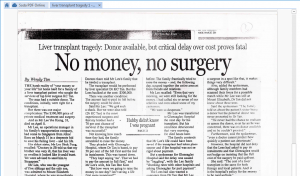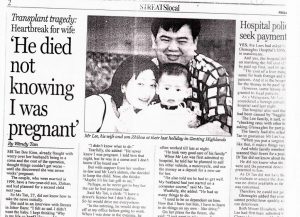Nowadays, with the rising medical cost, a cashless admission medical card, but the insurer sadly denies your medical claim. The insurer cheats. Let us dive in to determine why the insurer denies your medical claim.
Firstly, we need to understand the importance of the principle of utmost good faith.
This legal notion, known as uberrimae fides, demands contracting parties act honestly and truthfully and not mislead or hide any critical information for the contract’s success.
Good faith dictates that both parties must disclose all relevant facts to an insurance arrangement. Honesty implies submitting accurate premiums and coverage limits to the insurance company. Expect the applicants to provide all relevant personal information truthfully.
When signing the contract, the insured and an insurer requires all parties to act in good faith. Insurers play a much more significant role than their insured counterparts, bound by the agreement regarding Utmost Good Faith.
Insurer sadly denies your medical claim
The tragic Case of Liver Transplant is highlighted in Singapore.
‘He died not knowing I was pregnant was the headline on Singapore Strait Time on Friday, June 7, 2002. Too much money, too little time: frantic efforts to raise finances for a liver transplant. A donor is available, but a significant delay over cost proves fatal in this case. “Without money or surgery, there is no solution.
I flashed the headlines of a heart-breaking love story across the local paper. A heartless mercenary surgeon had refused to admit a patient. Like adding salt to the wound, the insurer declined a so-called cash admission to a local private hospital.
The insurer sadly denies your medical claim
Jaundice
The chronicle of the misfortune began in
The local specialist diagnosed him suffered jaundice zymolysis. The hospital requested him to pay upfront RM5,230.00 for admission. Look here! It was supposed to be a cashless admittance using a medical card. Later, the specialist discovered he suffered from Hepatitis B as the cause of his illness.
Lacking a liver surgeon to perform a liver transplant there, the hospital found a solution for transferring based on the patient’s grave condition necessitated an immediate transfer to a Singapore private hospital, where he underwent a liver transplant.
When he was ready for a liver transplant, he transferred the patient to another private hospital in Singapore. The donor was the late patient’s older sister, who gave her liver for her younger sibling’s transplant as a tribute to her brother.
Claim Deny
With no money, there will be no surgery.
“Before the surgeon can execute the surgery, you must first locate a suitable liver donor and then pay a deposit of S$300,000 in full.” According to the hospital, “No money, no surgery” was the policy of the second private hospital in Singapore.

The patient’s family disposed of their share, gold, and jewellery and even borrowed money from distant relatives to save him. They had enough cash in hand; they deposited the hospital. The hospital admitted her as a donor to the hospital for a liver transplant.
Misfortune befalls the family; that morning, the Lord called her youngest brother’s life to an end since he could no longer hold on.
Whatever has passed is ash to ash, dust to dust, but the living must carry on. The deceased family submitted a claim with the general insurance company for an amount insured of RM75,000.00 for the medical card claim. The surprising response from an insurance company.
Insurer sadly denies your medical claim
Ineligible for Claim

It is with deep regret the insurer informs you that the medical expenses for the treatment of your condition are not claimable under the following policy exclusion:
General Exclusion (11) – “suicide or attempted suicide, self-inflicted injuries, self-destruction or any attempt thereat while sane or insane. “
General Exclusion (9) – “… treatment of alcohol dependence syndrome and drug addiction/abuse.”
There was no resolution after numerous visits to the lawyer appointed. On the other hand, the lawyer demanded RM2,000 from the family just to get started. For two years, there was no hearing from the session court.
At the same time, many friends helped the deceased family write many appeal letters to the Malaysian Mediation Bureau or Ombudsman for Financial
Services. All the attempts failed.
A coincidence meeting at the shopping mall, I pumped into a lady giving me a stern glance several times,
At first, we didn’t realize we had previously worked together until I accidentally ran into his sister by accident. We talked over for a cup of tea.
“Jamin wong, can you help me get the case for my late brother? I need your help.”
“When we separated the factory export department, I was confident that you were still pursuing your studies in Chartered insurance, and now it is time you would be able to aid me.” She begged me to listen to her.
Insurer sadly denies your medical claim
“Sure, it’s my pleasure to assist people who have a genuine claim, but those lawyer’s correspondence letters, please do not give to me. I want the proposal form, cover note, policy jacket, and rejection claim letter reply from the insurer.
I will study the case within two weeks and give you a reply If I have a 90 percent chance of winning, I shall write an appeal letter on your behalf to the Bank Negara Insurance Mediation Bureau. Is that alright with you?
Even though it mentioned Hepatitis B in the brother’s proposal form, the insurer issued no exclusion on hepatitis b. The insurer did not include an exclusion clause in the renewal notice. for hepatitis B. After carefully reviewing the liver specialist’s diagnostic report, the patient died of abrupt liver failure due to Hepatitis B, not consuming slim tablets. The deceased is taking slimming pills prescribed by general practitioners.
Insurer sadly denies your medical claim
The insurer did not uphold the utmost Good Faith.

In the proposal form, the insured had the duty to disclose that he was a hepatitis B carrier, which he had done in good faith. The veteran general insurance agent stated that he had Hepatitis B, and the underwriter accepted the offer without any exclusion on Hepatitis B. As a result, the insurer did not honour their obligation of the utmost good faith.
The End Is Sweet
In the appeal letter, I highlight only one A4-sized piece of paper in the grey area.
After inspecting the appeal letter and all the reasons I gave, the bureau confirmed the insurer needed to pay the entire medical claim. A happy conclusion, of course. The insurer sent the widow a check for RM75,000 on July 30, 2004.
The insurer doesn’t cheat the public but finds a loophole to deny your claim. Please read carefully and understand the acceptable tiny printed wording. Before accepting the offer, there is a cooling period of 14 days. If you doubt an unflavoured term, request to amend it accordingly.
In any insurance, the best is not to hide the facts and reality from the insurer. Like in the case of medical insurance, declare your pre-existing illness, for instance, hypertension. You orally take the pill daily but tell the agent not to write the actual scenario.
As a party to the contract, you do not practice utmost good faith; the insurer can void the warranty and deny your claim. You are buying insurance for the peace of mind, not giving you a hard egg later. Beware; don’t naively treat the insurer as a dummy.
The insurer paid a small claim but denied a more significant claim. We’ll see how the insurer breaks the tenet of utmost good faith in the next episode.
Suppose you like this blog post article. Please share it with you or your family member. I am most happy to help on this claim matter; please give a constructive comment in the box below.

One thought on “Insurer sadly denies your medical claim”